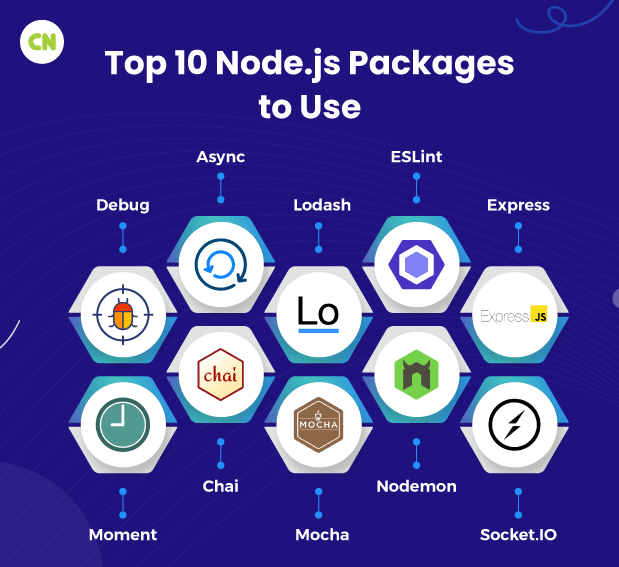10 Crucial Node.js Packages for Modern Development Needs
Table of Contents
Node.js has gained importance in this digitally-driven world for powering the backend of many applications with its event-driven, non-blocking I/O model. This high-performing and scalable environment is further enhanced by an extensive array of Node.js packages. Developers can access these packages through the Node.js package manager (NPM) to construct robust, feature-rich applications efficiently.
Navigating through the extensive assortment of available Node.js packages can seem daunting. However, these resources provide developers with a tailored tech stack that can be used for nearly every possible task. Among the numerous options, certain Node.js packages distinguish themselves for their functionality, efficiency, and reliability.
In this article, we will provide detailed insights into the top 10 Node.js packages, how these packages simplify the development process, and how they expand the possibilities of what can be achieved with Node.js for innovation and excellence in web development.
Criteria for Selecting Top Node.js Packages
In the selection of top Node.js packages, there are certain essential criteria. These criteria ensure that the chosen packages align with the best practices and demands of modern development.
-
Performance and Reliability
Performance is a non-negotiable aspect when choosing Node.js packages. The top packages are those that enhance application performance, offering efficient solutions without compromising on quality or stability. Reliability is ensured through rigorous testing and proven track records. This guarantees that these Node.js packages can meet the demands of real-world applications, making them critical tools in a developer’s tech stack.
-
Popularity and Community Support
A Node.js package’s popularity often reflects its utility and robustness. High usage rates and strong community support indicate a package’s reliability and the likelihood of receiving timely updates and patches. When selecting Node.js packages, a vibrant community implies a wealth of shared knowledge and troubleshooting resources, making it a critical factor in decision-making processes.
-
Versatility and Ease of Integration
The best Node.js packages offer versatility and straightforward integration. It is important for a package to adapt to your project easily and cater to your requirements. Furthermore, it must be able to integrate with your project without extensive configuration. The versatility and ease of integration of these packages can streamline the entire development workflow.
10 Node.js Packages for Optimized Application Development

The following 10 Node.js packages offer unique features to optimize and enhance your development process. Explore them in detail below:
1 Debug
Debug is an essential and lightweight JavaScript debugging utility modeled after Node.js core’s debugging technique. It is a highly favored tool among developers due to its simplicity and effectiveness. Debug allows for granular control over debugging output, making the debugging process in Node.js applications more intuitive.
Key Features:
- Simplicity: Offers a straightforward and easy-to-use interface for logging debug messages.
- Environment-based Control: Enables or disables debug output based on environment variables, providing flexibility in managing unnecessary codes without cluttering production logs.
- Namespace support: Allows the creation of debug instances with specific namespaces, making it easier to distinguish between log outputs from different parts of the application.
- Color-coded output: Enhances readability of logs by color-coding output based on the debug instance or namespace, useful for quick log scanning.
- Browser support: Compatible not just with Node.js but also with browser environments, aiding in consistent debugging across platforms.
- ollaborative debugging: Streamlines the process of sharing debug information among team members using standardized namespaces and log formats.
Implementation example:
You must first set it up in your Node.js application to use Debug. Here’s a simple setup:
const debug = require('debug')('http:server');
const http = require('http');
const server = http.createServer((req, res) => {
debug('Received request for %o', req.url);
res.writeHead(200, {'Content-Type': 'text/plain'});
res.end('Hello world\n');
});
server.listen(3000, () => {
debug('Server started on port %o', 3000);
});
In the above example, debug instances are created with the namespace “http:server”. When the environment variable DEBUG includes this namespace (set via “DEBUG=http:server”), the debug output is enabled, and you’ll see logs in the console for incoming requests and server start-up.
2 Async
Async is a powerful utility Node.js package that provides straightforward and efficient functions to Node.js programmers working with asynchronous JavaScript. By offering a range of utilities for control flow, collection handling, and other utility functions, Async helps in managing asynchronous operations, making code more readable and maintainable.
Key Features:
- Control flow utilities: Provides functions like “series”, “parallel”, and “waterfall” to manage the execution order of asynchronous functions with clear, structured control flow.
- Collection operations: Offers powerful operations like “each”, “map”, and “filter” for handling collections asynchronously.
- Error handling: Facilitates better error handling in asynchronous code by providing a consistent interface for callbacks.
- Performance optimizations: Optimizes concurrency handling, allowing control over how many asynchronous operations run in parallel.
- Asynchronous loops: Provides a cleaner and more manageable approach to implementing loops for asynchronous operations compared to traditional callbacks.
- Compatibility: Works seamlessly across Node.js and browser environments, ensuring consistent behavior across platforms.
Implementation example:
Here’s an example of using Async to manage a series of asynchronous operations:
const async = require('async');
async.series([
function(callback) {
// do some task
console.log('First task');
callback(null, '1');
},
function(callback) {
// do another task
console.log('Second task');
callback(null, '2');
}
],
// optional callback
function(err, results) {
// results is now equal to ['1', '2']
console.log('All tasks completed:', results);
});
In this example, two tasks are executed in series. The second task starts only after the first one is completed. The final callback collects the results of all the tasks.
3 Lodash
Lodash is a highly popular utility library for JavaScript, known for its rich set of functions designed to ease the manipulation and iteration of arrays, objects, and strings. Its consistent performance and modular approach make it an indispensable tool in modern web developers’ technology stack.
Key Features:
- Modularity: Functions are available as standalone or bundled, promoting a modular coding approach and helping to reduce the application’s footprint.
- Performance optimization: Delivers optimized performance for common tasks, thanks to internal optimizations and the usage of efficient algorithms.
- Functional programming: Encourages functional programming patterns, making code more declarative, less prone to errors, and easier to debug.
- Method chaining: Facilitates readable and expressive code through method chaining, allowing operations to be performed in a sequence on a collection.
- Template handling: Enhances the management and processing of templates, particularly when dealing with large datasets or complex structures.
- Deep operations: Provides deep operations like deep cloning, deep merging, and deep property access, simplifying complex tasks like sorting, filtering, and aggregating large collections.
- Wide compatibility: Ensures compatibility with a multitude of environments, including the browser, Node.js, and more.
Implementation example:
Here’s a simple example of using Lodash to manipulate and process collections:
const _ = require('lodash');
let users = [
{ 'user': 'fred', 'age': 48 },
{ 'user': 'barney', 'age': 34 },
{ 'user': 'fred', 'age': 40 },
{ 'user': 'barney', 'age': 36 }
];
// Sort by user and then by age using the chaining functionality
let sortedUsers = _.chain(users)
.sortBy('user')
.sortBy('age')
.value();
console.log(sortedUsers);
In this example, Lodash’s “chain” function is used to sort a list of users first by their name and then by their age in a fluent and readable manner.
4 ESLint
ESLint is a powerful and flexible static code analysis tool for identifying problematic patterns or code that doesn’t adhere to certain style guidelines in JavaScript and JSX. Its pluggability allows teams to craft and enforce a consistent code style, leading to more maintainable and error-free codebases.
Key features:
- Customizable rules: Offers a wide array of configurable rules, allowing teams to enforce their coding standards and best practices.
- Plugin system: Supports a vast ecosystem of plugins, enabling the extension of ESLint’s core capabilities to suit specific project needs.
- Automatic code fixing: Capable of automatically fixing many code issues, reducing the manual effort required to adhere to coding standards.
- IDE integration: Integrates seamlessly with most Integrated Development Environments (IDEs), providing real-time feedback and improving developer productivity.
- ECMAScript compatibility: Stays up-to-date with the latest ECMAScript standards, ensuring that modern codebases are properly linted.
Implementation example:
Setting up ESLint in a project involves a few simple steps:
-
Initialize ESLint
# Install ESLint npm install eslint --save-dev # Set up a configuration file npx eslint --init -
After initialization, you can run ESLint on any file or directory like so:
# Lint a specific file npx eslint yourfile.js - ESLint will analyze the code in “yourfile.js” and report any issues based on the configured rules.
5 Express
Express is one of the leading Node.js frameworks with a minimalistic and flexible nature. This Node.js web application framework offers comprehensive features tailored for developing RESTful APIs, Single Page Applications (SPAs), and complex web and mobile applications.
Key features:
- Minimalistic: Designed to be lightweight and simple, offering basic web server features out of the box and allowing developers to extend its functionalities as needed.
- Middleware support: Supports a wide range of middleware, enabling developers to add features and custom functionalities to their applications effortlessly.
- Routing: Provides advanced routing capabilities to manage requests to different URI endpoints.
- Performance: Optimized for performance, ensuring that applications built with Express can handle high loads and deliver content quickly.
- Template engines: Integrates seamlessly with various template engines, simplifying the process of generating HTML from templates.
- Socket.IO integration: Pairs well with Socket.IO for building real-time applications like chat applications or live data visualizations.
Implementation example:
Here’s a basic example of setting up an Express server:
const express = require('express');
const app = express();
const port = 3000;
app.get('/', (req, res) => res.send('Hello World!'));
app.listen(port, () => {
console.log(`Example app listening at http://localhost:${port}`);
});
In this snippet, an Express application is created that listens on port 3000. It defines a single route, “/”, which sends “Hello World!” as a response to client requests. For those looking to develop more complex applications or integrate advanced features, it may be beneficial to hire Node.js developers with extensive experience in Express. These professionals can not only expedite the development process but also ensure that the architecture is scalable and maintainable.
6 Moment
Moment is a highly popular Node.js package for parsing, validating, manipulating, and displaying dates and times in JavaScript. It is known for its ease of use and comprehensive feature set. Furthermore, it simplifies date-time-related operations, a common challenge in web development.
Key features:
- Robust parsing Accurately parse dates in various formats and convert them as needed.
- Flexible manipulation: Effortlessly add, subtract, or modify dates and times.
- Comprehensive formatting: Format dates and times in a wide range of human-readable formats.
- Timezone support: Handle different timezones, ensuring consistent date-time management across locales.
- Query functions: Check dates’ relative positions (past, future) and compare them easily.
Implementation example:
Integrating Moment into a Node.js project is straightforward:
const moment = require('moment');
let now = moment();
console.log(now.format('YYYY-MM-DD')); // Outputs current date in YYYY-MM-DD format
let birthday = moment('2000-01-01');
console.log(birthday.fromNow()); // Outputs the time from the date to now in words (e.g., '22 years ago')
In this example, Moment is used to format the current date and calculate the time from a specific date to the present.
7 Chai
Chai is a highly regarded assertion library in the package ecosystem, providing Node.js developers with a range of expressive language constructs to perform assertions in their testing. It integrates smoothly with any Node.js testing framework, enhancing the testing experience with readability and flexibility.
Key features:
- Expressive syntax: Offers a rich and readable language for structuring assertions, making tests easy to write and understand.
- BDD and TDD styles: Supports both Behavior-Driven Development (BDD) and Test-Driven Development (TDD) assertion styles, catering to different development methodologies.
- Plugin extensibility: Allows the use of third-party plugins to extend its core capabilities, adapting to various testing requirements.
- Chainable language: Assertions can be chained together to form expressive and comprehensive test statements.
- Compatible: Works seamlessly with other Node.js npm packages and testing frameworks like Mocha, providing a versatile testing solution.
Implementation example:
Integrating Chai in a Node.js project is intuitive:
const chai = require('chai');
const expect = chai.expect;
describe('Array', function() {
describe('#indexOf()', function() {
it('should return -1 when the value is not present', function() {
expect([1, 2, 3].indexOf(4)).to.equal(-1);
});
});
});
In this example, Chai is used to assert that the “indexOf()” method returns “-1” when the searched value is not present in the array.
8 Mocha
Mocha is a feature-rich JavaScript test framework running on Node.js, making asynchronous testing simple and fun. As a staple in the Node.js packages collection, it provides developers with the tools to create and manage tests with ease and precision.
Key features:
- Flexible and accurate: Supports testing of both synchronous and asynchronous code, ensuring comprehensive coverage.
- Integration testing: Assists in verifying the interaction and integration between different modules of an application.
- Rich interface: Offers multiple interfaces like BDD, TDD, and QUnit styles, catering to different developer preferences.
- Timeout support: Configurable timeouts help handle tests involving operations that take unpredictable time.
- Browser support: Capable of running tests in the browser, broadening the testing scope beyond just Node.js environments.
- Reporters: Provides a variety of reporters to visually display test results, enhancing the understanding of test outcomes.
- Continuous Integration (CI): Easily integrates with CI tools, ensuring that tests are automatically run with every code change.
Implementation example:
Setting up Mocha in a Node.js project is straightforward:
const assert = require('assert');
describe('Array', function() {
describe('#indexOf()', function() {
it('should return -1 when the value is not present', function() {
assert.equal([1, 2, 3].indexOf(4), -1);
});
});
});
In this snippet, Mocha is used to define a simple test that checks the behavior of the “indexOf()” method in an array.
9 Nodemon
Nodemon is a utility among Node.js packages that monitors changes in your source code and automatically restarts the server. It’s a favorite tool for developers aiming to increase productivity and efficiency during the development phase of Node.js applications.
Key features:
- Automatic restart: Automatically restarts the Node.js application when file changes in the directory are detected.
- Live testing: Ideal for environments where immediate feedback is crucial, such as when performing live code testing or debugging.
- Customizable watch: Configurable to watch specific directories or files, ignoring the ones irrelevant to restarts.
- Delay restart: Offers the ability to delay the restart of the application, allowing time for multiple files to be saved.
- Extensive support: Works with applications in languages other than JavaScript using the “exec” configuration.
- User-friendly: Simple to install and integrate, making the setup process straightforward and hassle-free.
Implementation example:
Integrating Nodemon into a Node.js project is seamless:
# Install Nodemon globally
npm install -g nodemon
# Run your application with Nodemon
nodemon your_app.js
Once set up, Nodemon will watch the files in the directory where “your_app.js” is located. Any changes will trigger an automatic restart of your application.
10 Socket.IO
Socket.IO is a prominent Node.js package designed for real-time, bidirectional, and event-based communication between web clients and servers. It’s a top choice in the Node.js npm packages ecosystem for building scalable, real-time applications effortlessly.
Key features:
- Real-time communication: Enables instant data transfer between clients and servers, perfect for chat applications or live data feeds.
- Auto-reconnection support: Automatically attempts to reconnect in case of disconnection, ensuring persistent communication channels.
- Binary streaming: Supports streaming of binary data, making it suitable for image or file transfers.
- Multiplexing support: Allows the creation of multiple namespaces and rooms, facilitating complex communication structures.
- Reliability and speed: Provides fast and reliable communication, essential for real-time applications.
Implementation example:
Setting up Socket.IO in a Node.js project is straightforward:
const app = require('express')();
const server = require('http').createServer(app);
const io = require('socket.io')(server);
io.on('connection', (socket) => {
console.log('a user connected');
socket.on('disconnect', () => {
console.log('user disconnected');
});
});
server.listen(3000, () => {
console.log('listening on *:3000');
});
In this example, a basic server is set up with Socket.IO listening for connections. Upon a user connecting or disconnecting, messages are logged to the console.
Conclusion
In today’s fast-paced web development world, staying updated with the most popular Node.js packages is crucial. The above-mentioned Node.js packages significantly enhance the Node.js ecosystem, driving modern web development forward. Each package is key to improving workflows, solidifying Node.js as essential for cutting-edge development.
Businesses can use the Node.js package manager to discover and integrate these packages. Their adaptability and strength will revolutionize your development process, leading to more efficient, scalable, and robust applications. Harness these tools to push your business’s technological boundaries with Node.js.


 Web Development
Web Development Cloud Engineering
Cloud Engineering Mobile App Development
Mobile App Development AI/ML/GenAI
AI/ML/GenAI E-commerce
E-commerce Software Development
Software Development UI/UX
UI/UX QA
QA Dedicated Teams
Dedicated Teams











